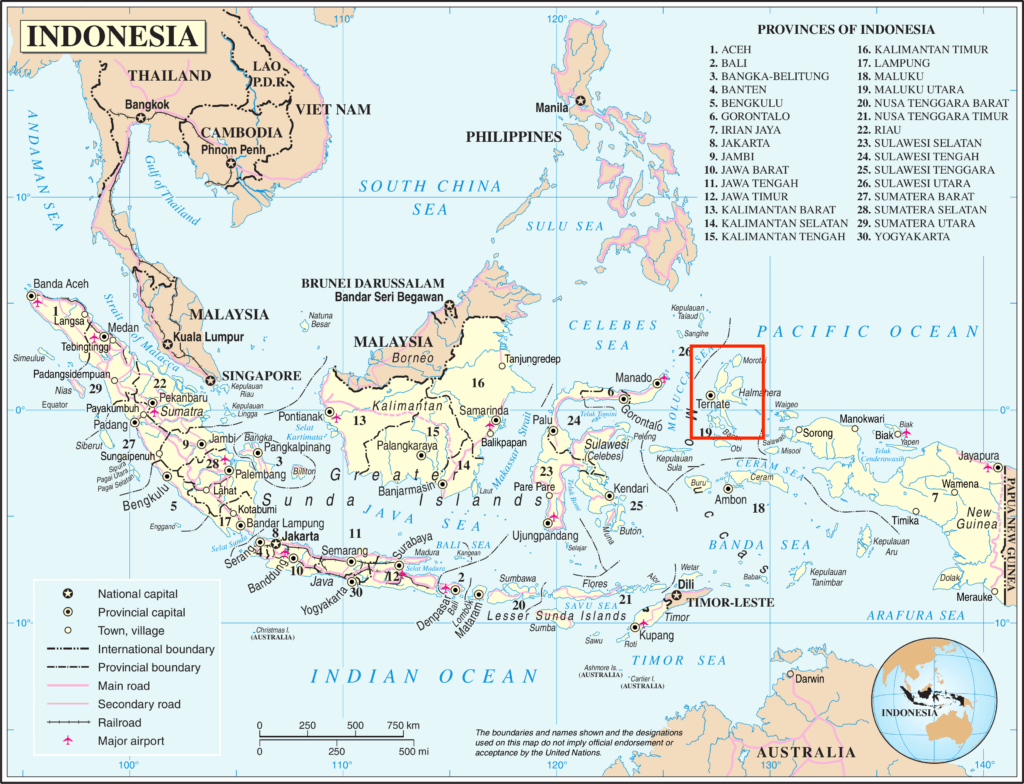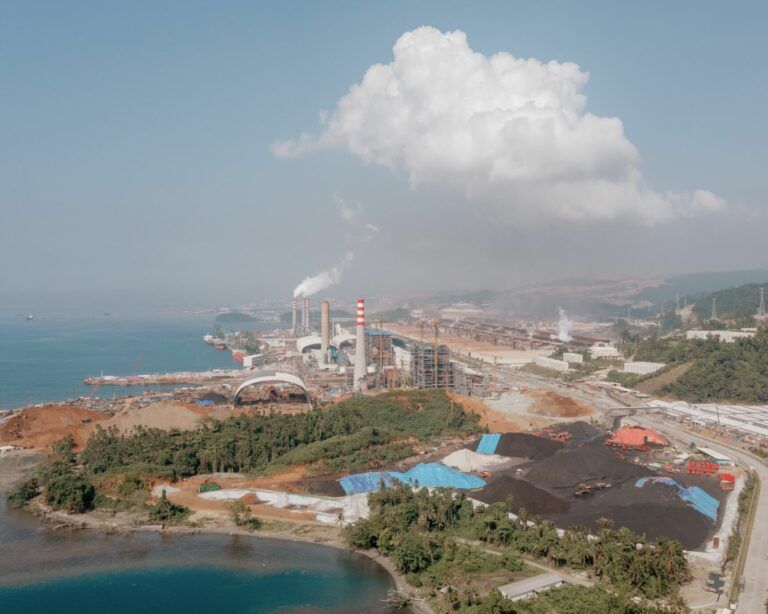Read in: English | Bahasa Indonesia | Full Report
(Jakarta, January 17, 2024) — A massive, multi-billion-dollar nickel industrial complex in North Maluku and nearby nickel mining is violating the rights of local communities, including Indigenous Peoples, causing significant deforestation, air and water pollution, and emitting massive amounts of greenhouse gases from captive coal plants, Climate Rights International said in a report and accompanying video released today.
For the 124-page report, “Nickel Unearthed: The Human and Climate Costs of Indonesia’s Nickel Industry,” Climate Rights International interviewed 45 people living near smelting operations at the Indonesia Weda Bay Industrial Park (IWIP) and nearby nickel mines on the island of Halmahera. Local residents explained how companies, in coordination with Indonesian police and military personnel, have engaged in land grabbing, coercion, and intimidation of Indigenous Peoples and other communities, who are experiencing serious and potentially existential threats to their traditional ways of life.
Much of the nickel processed at IWIP and elsewhere in Indonesia is exported to meet the growing demand for nickel for use in renewable energy technologies, including batteries for electric vehicles.
“The transition from gas-powered cars to electric vehicles is an essential part of the global transition away from fossil fuels to renewable energy, but the growing critical mineral industry must not perpetuate the same abusive and environmentally harmful practices followed for decades by extractive industries,” said Krista Shennum, Researcher at Climate Rights International. “Global automakers that source nickel from Indonesia, including Tesla, Ford, and Volkswagen, should take steps to ensure that nickel used in their electric vehicles is not driving human rights and environmental abuses.”
Indonesia is the world’s largest producer of nickel, supplying 48 percent of global demand in 2022. Across the country, massive nickel industrial parks, like IWIP, are being built to process nickel ore. Although the purpose of the EV transition is to reduce the carbon footprint of the automobile industry, smelting at nickel industrial parks, including IWIP, has a massive carbon footprint, Climate Rights International said. Instead of using plentiful renewable solar and wind power, IWIP has built at least five captive coal-fired plants since 2018, with plans for a total of twelve new coal plants. They will provide an estimated 3.78 gigawatts per year of energy by burning low quality coal from Kalimantan, which is more coal than Spain or Brazil use in a single year.
Nickel mining in the area is also a significant driver of deforestation and biodiversity loss. At least 5,331 hectares of tropical forests have been cut within nickel mining concessions on Halmahera, totaling a loss of approximately 2.04 metric tons of greenhouse gases (CO2e) previously stored as carbon in those forests.
Indigenous Peoples have the right to participate in decision-making in matters which would affect their rights, including the right to exercise free, prior, and informed consent (FPIC) prior to the approval of any project affecting their land, territories, or resources. Yet, Indigenous Peoples repeatedly said that they were not told the purpose of land acquisition or any other details of the project by any nickel mining or smelting companies.
Communities living in Central and Eastern Halmahera have long depended on natural resources to sustain themselves and their families as artisanal fisherfolks, farmers, sago-makers, and hunters. The report documents how the nickel industry’s destruction of forests, acquisition of farmland, degradation of freshwater resources, and harm to fisheries has made it difficult, if not impossible, to continue traditional ways of life.
According to Max Sigoro, a 51-year-old Sawai fisherman from the coastal village of Gemaf just outside of IWIP,
“Before the mining, the fish stock was abundant, the sea was clear. Now, I can’t catch fish near [IWIP]. The water is dirty, and the security chases us away. The water pollution is from mining. There is oil in the water from the machines. Also, hot water from the power plants is polluting the ocean. Sometimes the water is reddish. We used to row our boats close to the shore to fish, now we have to go further out.”

Nickel mining and smelting operations are threatening local residents’ right to safe, clean drinking water, as industrial activities and deforestation are polluting the waterways on which local communities depend for their basic needs, Climate Rights International said. Community members are also concerned that increasingly common flooding events are linked to deforestation by nickel mining companies.
A lack of transparency or provision of basic information by companies and the Indonesian government is making the situation worse. Community members have difficulties accessing information about the consequences of industrial pollution on their health. Neither IWIP nor the Indonesian government provides publicly available or accessible information on air and water quality to local residents.
Government Responsibility
Climate Rights International called on the Indonesian government to strengthen laws and regulations to minimize the impacts of nickel mining and refining on communities, including on Indigenous communities. It should also order companies, as well as government and private security forces. to end all threats and intimidation against local residents who oppose the activities at IWIP or related mining operations.
The Ministry of Energy and Mineral Resources should fully assess, monitor, and investigate alleged environmental pollution and make the findings of that investigation publicly available and accessible. The Ministry of Agrarian Affairs and Spatial Planning should immediately recognize Indigenous communities’ customary land and ensure that nickel mining and refining companies respect the rights of local and Indigenous communities. The government should also immediately stop the permitting of all new coal plants, including captive coal plants used to power industrial areas.
Corporate Responsibility
Harms to local communities and the environment are being driven by the activities of the dozens of domestic and foreign-based companies engaged in nickel mining and refining in Central and East Halmahera, including at IWIP.
IWIP is a joint venture of three private companies headquartered in the People’s Republic of China: Tsingshan Holding Group, Huayou Cobalt, and Zhenshi Holding Group. In addition to these three shareholders, a growing number of companies have announced plans to build industrial facilities within IWIP to produce nickel materials needed for EV batteries.
Eramet and BASF have announced plans to build a nickel and cobalt refining facility, called Sonic Bay, that would produce 67,000 tons of nickel and 7,500 tons of cobalt per year. In addition, POSCO has announced plans for a $441 million plant in IWIP with the capacity to produce 52,000 metric tons of refined nickel per year, enough for roughly one million EVs.
The three main stakeholders in IWIP – Tsingshan, Huayou, and Zhenshi – should take immediate steps to remedy water and air pollution caused by their operations, and nickel mining companies should properly dispose of mine tailings to minimize environmental pollution. Both IWIP and nickel mining companies should fully and fairly compensate all community members, including Indigenous Communities, for their land and ensure that Indigenous Peoples are able to provide full free, prior and informed consent as established by international human rights law. Companies should also engage in mediation with impacted communities near IWIP regarding how best to remedy harms already caused by ongoing operations.
Electric vehicle companies such as Tesla, Ford, and Volkswagen that have contracts to source nickel from Indonesia, including from companies with operations at IWIP, should immediately use their leverage to push suppliers to address harms to local communities and the environment, and if necessary, suspend sourcing nickel from companies responsible for such abuses.
Adlun Fikri, a 29-year old Sawai activist from Sagea, summed up to Climate Rights International how many local residents feel about IWIP and related mining:
“In the upstream area where they mine, it’s destructive, degrading forest, destroying forest, and causing human rights violations. The local residents here bear the cost for global ambition [of net zero]. Western people enjoy the electric vehicle, and meanwhile we get the negative impact.”
“It is an unacceptable, false climate solution to build new captive coal plants to power nickel processing operations and to deforest such large areas for nickel mining,” said Shennum. “Electric vehicle companies should ensure their critical mineral supply chains are fossil fuel free, and foreign governments – including the U.S. and E.U. member states – should provide financial support to Indonesia’s energy transition, including to decommission these coal plants.”
Photo: An aerial view of the Indonesia Weda Bay Industrial Park (IWIP), including captive coal plants and nickel smelting operations. Credit: Muhammad Fadli for CRI.






